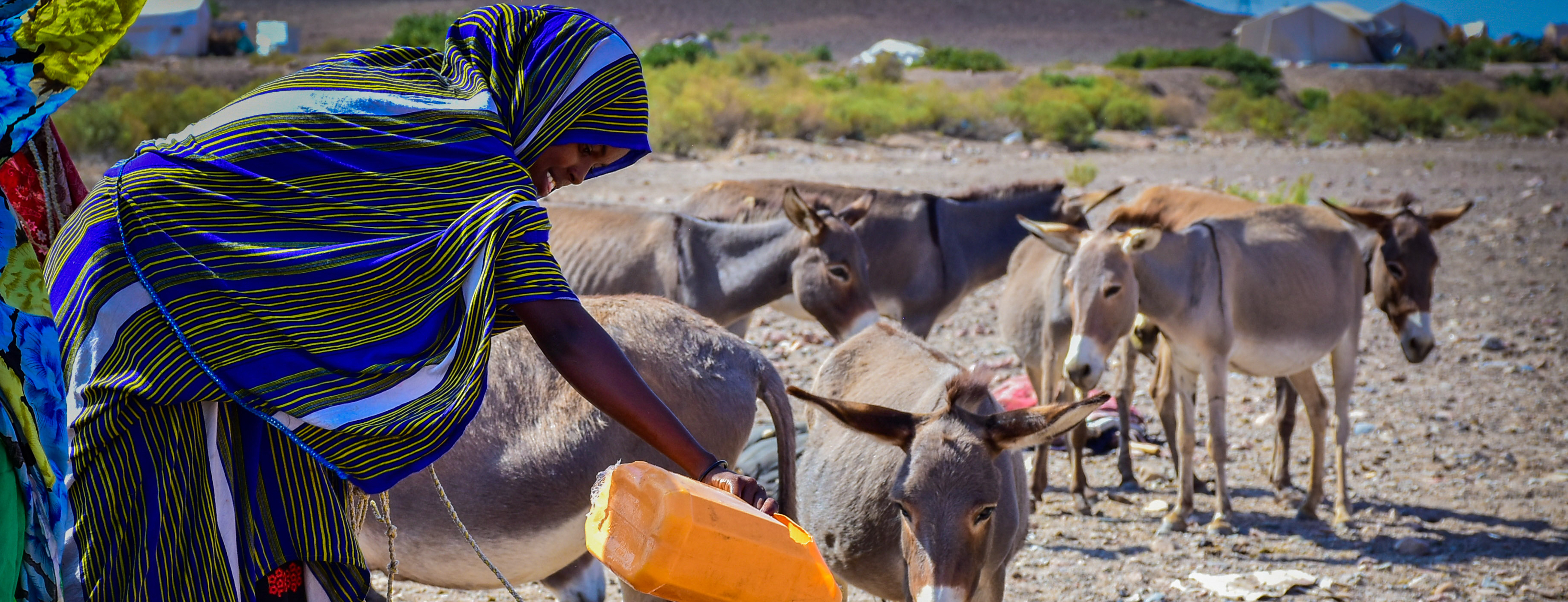
Photo:
Situated in the Horn of Africa, the Republic of Djibouti is located on the Gulf of Aden at the southern entrance of the Red Sea and shares borders with Eritrea, Ethiopia, and Somalia. The country’s terrain is rocky, comprised of plateaus, plains, volcanic formations and mountain ranges. Djibouti has very little arable soil; 89 percent of the country is desert, 10 percent is pasture, and 1 percent is forested. As a result of little precipitation and lands unsuitable for agriculture, Djibouti imports nearly all of its food.
Djibouti is prone to a number of natural hazards, including multi-annual droughts, frequent flash floods, frequent earthquakes, and fires fueled by droughts. Sea level rise represents a great threat to Republic of Djibouti, particularly in Djibouti town where around 70 percent of the population is concentrated. Climate change will have impacts on the Djibouti marine and terrestrial ecosystems, as well as the already highly compromised agricultural sector. Djibouti is a resource scarce country with a vulnerability to natural disasters that is exacerbated by scarce water resources management, subpar land use planning, lack of building code enforcement, and limited capacity to react to natural disasters.
- National
- National Governments
- Private Sector Partners
- Food and Agriculture Organization of the United Nations (FAO)
- United Nations Development Programme (UNDP)
- Government of Djibouti
Djibouti has undertaken several adaptation actions to tackle climate change. The National Adaptation Programme of Action (NAPA), submitted to the UNFCCC in 2006, identified the most vulnerable sectors to climate change impacts to be water resources, agriculture and livestock, forestry, coastal and marine ecosystems. A first assessment of climate change vulnerabilities of these sectors was conducted, and several urgent adaptation actions were identified and ranked according to their level of priority.
In 2014, the government adopted a new reference framework that sets a long-term orientation: the 2035 Vision. One year later, its five-year action plan was elaborated. The first Strategy of Accelerated Growth and Promotion of Employment (SCAPE) was adopted and serves as a medium-term version of the 2035 Vision. SCAPE’s tenth goal concerns climate change adaptation and resilience building with a focus on rural communities and the integration of adaptation into sectoral policies.
In 2015, the country submitted its Nationally Determined Contribution (NDC) for the reduction of greenhouse gas emissions under the Paris Agreement framework. This document reaffirms Djibouti’s commitment and sets adaptation as a national priority. It identifies the following adaptation priorities: (i) the reduction of vulnerability to drought; (ii) protection against sea level rise; (iii) improvement of access to water; (iv) protection of biodiversity; and (v) reinforcement of the resilience of rural populations.
In 2017, a National Strategy on Climate Change (SNCC) was prepared to enhance coherence between climate change actions and existing national frameworks (NDC and SCAPE), and to address climate change impacts in the various socio-economic sectors of the country. The SNCCC defines six priority areas and also indicates that implementation in these areas will be facilitated by establishing a platform for sharing techniques and knowledge on adaptation and mitigation, as well as mechanisms for measuring, monitoring and conducting environmental assessments
At the sectoral level, the National Programme for Agricultural Investment and Food and Nutrition Security (PNIASAN) 2016-2020, provides opportunities for integration of adaptation into sectoral polities, agriculture, livestock and fishery in particular. This planning framework document for the Agriculture, Water, Livestock and Fishery sectors touches upon adaptation needs focusing on the water-agriculture nexus and the support to vulnerable fishing and farming communities.
The NAP process in Djibouti has been supported by a range of partners including the joint UNDP-UN Environment National Adaptation Plan Global Support Programme (NAP-GSP), the LDC Expert Group (LEG), FAO through its support to National Agricultural Investment and Food Security Plans, and the European Union through the Global Climate Change Alliance.
The Government of Djibouti has requested support from the SCALA Private Sector Engagement (PSE) Facility to assist in designing the UNDP-supported integrated program titled GREENING Djibouti: Climate Resilience and Livelihoods Programme, expected to be financed through multiple sources including, Global Environment Facility (GEF), Green Climate Fund (GCF), bilateral donors, International Finance Institutions (IFIs), and private sector investment. The programme aims to build the country’s resilience to the impacts of climate change, with gender equality and women’s empowerment also a key aspect of the program’s approach to achieving its core vision.
SCALA PSE’s support will strategically contribute towards attaining national objectives and help design the current integrated GREENING Djibouti program by providing supporting studies on measures to develop climate-resilient agricultural and livestock value chains for farmers in Djibouti and explore financing mechanisms that can crowd-in resilient private investments into these value chains, with a view towards increased market linkages and commercialization.
Scope of work
Conducting value chain selection process, detailed value chain mapping and analysis.
Activities include:
- Desk review and gap analysis
- Value chain selection
- Value chain overview
- Enabling environment overview
- Value chain mapping
- Market, climate change and gender analysis
- Value chain financing opportunities and constraints
- Validation workshop
